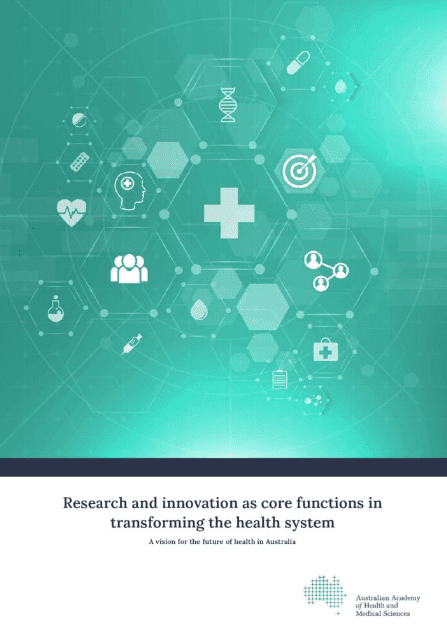Australia’s health and medical science leaders have today released a comprehensive plan to transform healthcare by better integrating research and health.
The report, Research and innovation as core functions in transforming the health system: a vision for the future of health in Australia, released today by the Australian Academy of Health and Medical Sciences outlines a case for better supporting research within the health system.
National and international evidence show that this kind of system is better equipped to transform health outcomes for the community, enhance health system management, and optimise the economic benefits of Australian innovation.
“Our 2013 Strategic Review of Health and Medical Research explored how Australia could use research to improve health,” says Simon McKeon AO.
“Nearly 10 years on, there is still more to be done. Research and innovation are more important than ever, and rapid translation of research outcomes into patient care can save lives. The Academy’s report sets out how Australia can better embed research and innovation at the heart of our health system – by doing so, we can deliver the best and most efficient evidence-based care for the Australian community.”
In the past two decades transformations in health have been driven by research. For example, metastatic melanoma is no longer an automatic death sentence. Breast cancer survival rates have improved from 73 per cent to 91 per cent in Australia over twenty years. HIV under control in Australia, turning it into a chronic disease.
Australia’s COVID response has shown how researchers and clinicians can mobilise to work with government and community to meet national needs and inform rapid decision making.
The rapid development of COVID vaccines has saved thousands of lives in Australia and many millions around the world.
Underpinning these and many other achievements has been the rapid translation of health research from the laboratory to patient care and policy.
And yet, it has been estimated that on average only 60 per cent of healthcare aligns with evidence or consensus-based guidelines. 30 per cent is comprised of some form of waste or is of low value and, alarmingly, 10 per cent is associated with harm.
Much of the health budget is consumed by managing health issues that we should be able to cure or prevent.
“We know from international evidence that health systems that foster close collaboration between research and patient care deliver better patient experiences, improve patient outcomes, and increase staff satisfaction,” says Professor Christina Mitchell, Executive Dean, Faculty of Medicine, Nursing and Health Sciences at Monash University and chair of the AAHMS working group that has developed the report, Research and innovation as core functions in transforming the health system.
Working with more than 260 health leaders, consumers and individuals from government, research funders and industry, the AAHMS has outlined a three-year plan to:
- Address fragmentation by creating a new alliance for transforming healthcare through research.
- Build a skilled and enabled health research workforce, including a cohort of world-class clinician researchers.
- Maximise the value of current investments in research and innovation.
- Foster stronger consumer and community involvement in research and innovation
- Build integrated teams and cross-sector collaboration.”
“We have developed a suite of recommendations, designed to fit within and improve on our existing health and research frameworks. Most of the recommendations will improve health by making the best use of today’s investment in health research to create a sustainable health system,” Professor Mitchell says.
“We are currently briefing state and federal policymakers and health sector leaders on our three- year plan and how it can be implemented,” she says.
“In my field of neuroscience the seminal advances over the last decade, underpinned by the genomics revolution and improved imaging, have transformed our understanding of brain diseases,” says Professor Ingrid Scheffer, President of the Academy.
“The challenge before us now is to ensure rapid implementation of life-changing treatments globally – to efficiently integrate new evidence into healthcare to improve health outcomes for all.”
Download the full report or learn more about the Vision project.

